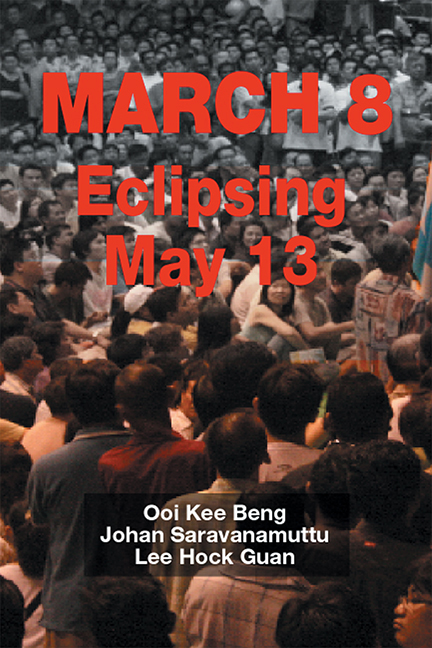Book contents
- Frontmatter
- Contents
- List of Tables and Charts
- Foreword
- Acknowledgements
- About the Authors
- Introduction
- 1 The Opposition's Year of Living Demonstratively
- 2 A Tectonic Shift in Malaysian Politics
- 3 The Ethnic Voting Pattern for Kuala Lumpur and Selangor in 2008
- Postscript: Anwar's Path to Power goes via Permatang Pauh
- Index
- Plate section
Postscript: Anwar's Path to Power goes via Permatang Pauh
Published online by Cambridge University Press: 21 October 2015
- Frontmatter
- Contents
- List of Tables and Charts
- Foreword
- Acknowledgements
- About the Authors
- Introduction
- 1 The Opposition's Year of Living Demonstratively
- 2 A Tectonic Shift in Malaysian Politics
- 3 The Ethnic Voting Pattern for Kuala Lumpur and Selangor in 2008
- Postscript: Anwar's Path to Power goes via Permatang Pauh
- Index
- Plate section
Summary
On August 26, 2008, former deputy premier Anwar Ibrahim managed to do what the snap general elections earlier that year had stopped him from doing. He succeeded in returning to the Dewan Negara (Lower House of Parliament) after an absence of exactly ten years.
That day, he won the by-election in his home base of Permatang Pauh in the state of Penang, and did it by substantially widening the already impressive margin of victory achieved by his wife Wan Azizah Wan Ismail in the general elections held about six months earlier.
This latest triumph is one rung higher in Anwar's climb towards the pinnacle of political power from which he fell in 1998. Sacked and arrested in September that year by his mentor-turned nemesis, Dr Mahathir Mohamed, Anwar suffered a bad beating while in detention and endured a subsequent humiliating and sordid trial. In 1999, he was sentenced to six years in jail for corruption, and the following year to nine years for sodomy in 1999. He was released in 2004 when the split decision in the Federal Court overturned the latter conviction on appeal.
Nevertheless, the prison term disqualified him from running for office until April 15, 2008. Strangely, Prime Minister Abdullah Badawi, who had won the biggest mandate in Malaysian history in 2004, chose to schedule early elections for March 8, one week before the ban on Anwar to run for office would run out.
The nature of Anwar's by-election success is significant in a number of ways. First, it showed that although voters — at least those in Permatang Pauh — may have been surprised at their own cheek in acting so forcefully against the government in the earlier election, half a year later they were apparently not regretting having made that stand.
Second, the by-election was also the first one to be lost, and badly at that, by the formidable electoral machine of the ruling Barisan Nasional (BN) since Abdullah Badawi became premier in 2003. The fall in support for the government seemed to be continuing.
Furthermore, Permatang Pauh is a constituency where almost 70 per cent of its constituents are Malays. The rest are mainly Chinese, with the Indians, the community most disenchanted with the BN at the moment, making up a mere 5.7 per cent of the voting population.
- Type
- Chapter
- Information
- March 8Eclipsing May 13, pp. 122 - 126Publisher: ISEAS–Yusof Ishak InstitutePrint publication year: 2008

